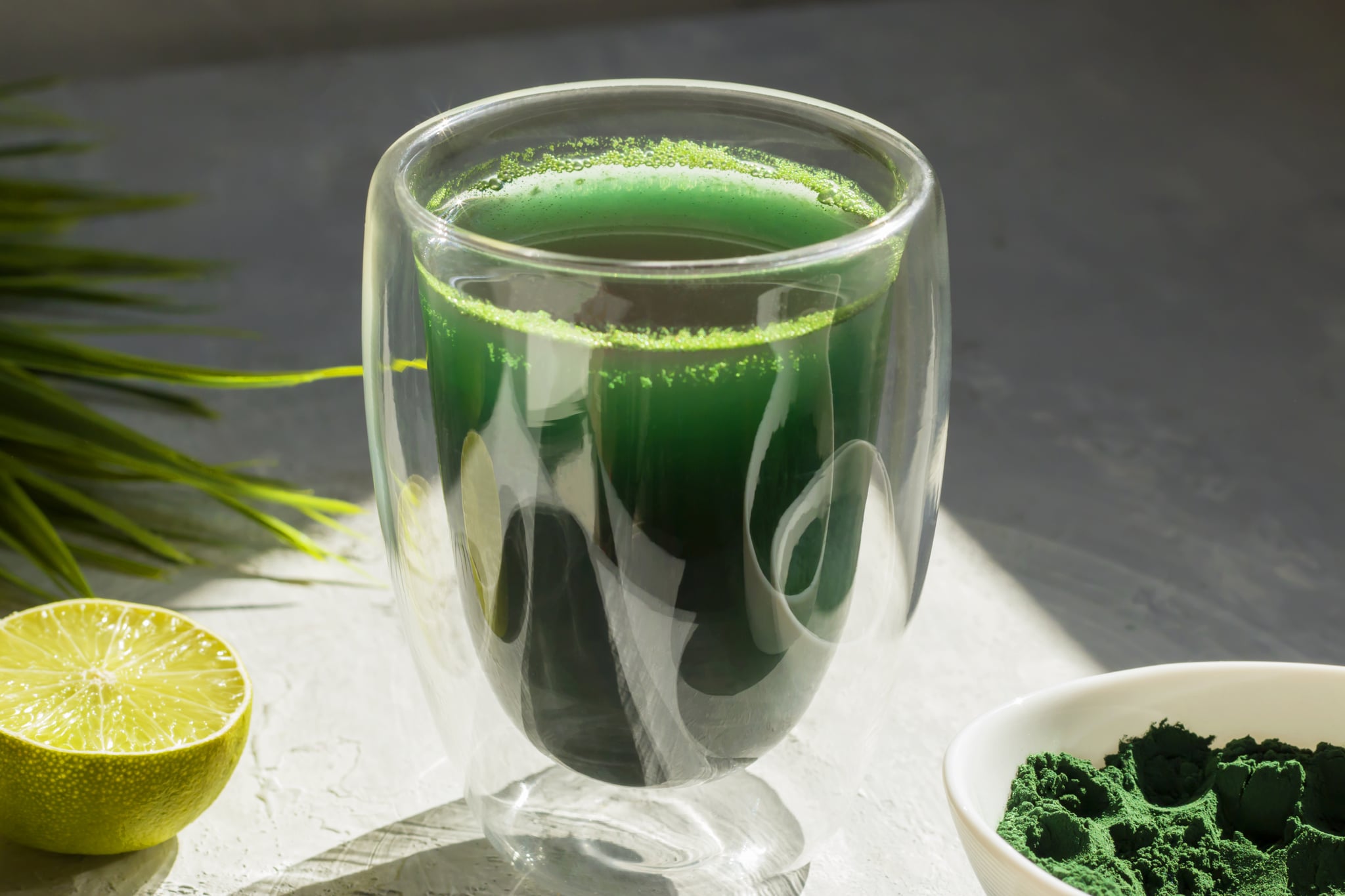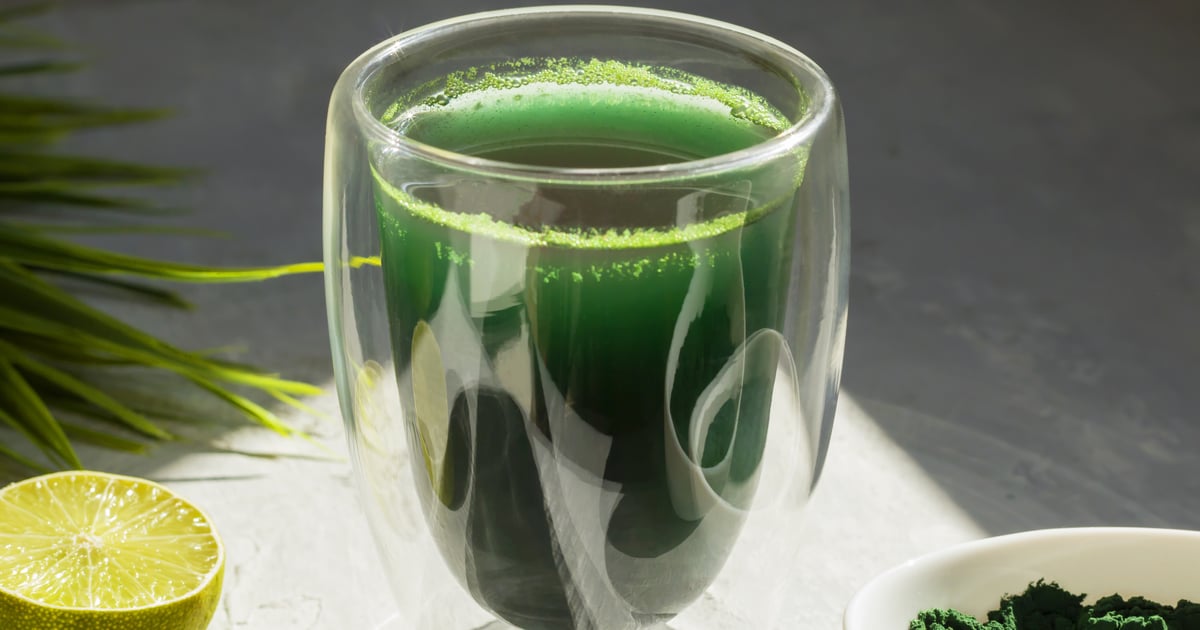Products You May Like

With over 225 million views on TikTok, videos with the hashtag #greenpowder have practically infiltrated the app. You know the ones: clips in which creators stir a grass-colored grit into a glass of water with a spoon. It’s all very “Get Out” — except the tea’s been traded for an earthy green mixture and you’re being hypnotized by an influencer (v. your girlfriend’s mother) as they regale the purported perks of the powder, from reducing bloat to boosting your immune system.
Between the sheer volume of videos and enticing health benefits, it’s hard not to be entranced and consider using a green powder yourself. But, as with all things on social media, you have to ask: are the benefits of green powders legit? And what’s really in these green powder supplements, anyway? Ahead, those answers — plus, the best green powders to try if you do decide to get in on the trend, all according to nutrition experts.
What Are Green Powders?
Green powder is best described as “a dietary powder supplement made from a large variety of different ingredients that attempts to match the nutrient profile of an individual’s recommended consumption of produce per day,” says Hannah Ball, RDN, CDN, owner of Hannah Ball Nutrition and registered dietitian at Wellory.
While the specific ingredients vary across brands, the supplement commonly contains an assortment of leafy greens, other vegetables (e.g. broccoli, carrots, beets), a type of seaweed (e.g. spirulina, chlorella), and grasses. Some varieties also include extra fiber (such as inulin, rice bran, or apple pectin), probiotics, digestive enzymes, and natural sweeteners, Ball says. And you won’t be hard-pressed to find green powders that contain fruits — often antioxidant-rich berries, according to Ball — too.
Unless an ingredient is a powder in its original state, odds are it’s been processed in some manner to ultimately become an easily dissolvable particle. In general, green powders are made either by dehydrating (i.e. drying) certain ingredients or juicing and drying them before crushing them into a powder.
No matter the methodology, the end result is one of the reasons why green powders are skyrocketing in popularity: they provide a convenient way to up your produce (and, in turn, micronutrient) intake, says Marissa Meshulam, MS, RD, CDN, founder of MPM Nutrition. “These powders can be a great option when you’re traveling or on the road and do not have as much access to fresh fruits and veggies. Plus, they tend to be a quite concentrated source of vitamins, minerals, and antioxidants, meaning you’re able to take in way more than you would typically be able to eat, which can provide an extra boost of the nutrients.”
That being said, it’s important to note that green powders are not a replacement for eating whole fruits and vegetables and maintaining a balanced diet. “However, if individuals feel that for whatever reason that is a challenge they can not meet, they could consider adding a powder as a supplement, not a replacement,” says Keri Gans, RDN, author of “The Small Change Diet” and host of the podcast “The Keri Report.”
Green Powder Benefits
Support the Immune System
“Since green powder originates from a variety of whole fruits and vegetables, they consist of nutrients that may be beneficial to our health,” Gans says. “For example, they may contain the antioxidants vitamins A, C, and E, which have anti-inflammatory properties and are associated with maintaining immune health.”
Plus, as mentioned above, some green powder varieties include gut-friendly probiotics, most commonly Lactobacillus rhamnosus or acidophilus or Bifidobacterium lactis, which have been shown to aid in immune function, Ball says.
Encourage Healthy Digestion
In addition to helping out your immune system, probiotics (such as those found in certain green powders) can help balance the gut microbiome, which is key for keeping your system running smoothly and reducing GI symptoms, such as bloating. But green powders don’t necessarily need to contain probiotics to promote healthy digestion — all of the fruits and veggies blended into the beverage should deliver some amount of fiber, too. While you’d typically consume way more fiber from eating whole produce v. in powdered form, fiber, in any amount, is vital for gut health, keeping you regular, promoting satiety and so much more, Meshulam says.
Boost Energy
Here’s the deal: many green powders claim to boost your energy levels, but “this may not be completely accurate in the way it’s being portrayed,” Ball says. That’s because green powders are generally low in calories, and at the most basic level, calories are the energy or fuel your body needs to function. Since green powders are low in calories, they can’t supply very much usable energy to the body in and of themselves. But when they’re, say, mixed into yogurt or blended into a smoothie — both of which typically have a healthy amount of calories per serving — it can seem like the supplement is providing you with more energy, she explains.
That being said, some green powders contain green tea extract, which has been shown to increase energy due in part to its caffeine content, per the Cleveland Clinic. So, drinking supplements with this ingredient can, in fact, leave you feeling more alert and awake.
As is the case with all supplements, green powders are not thoroughly regulated by the Food and Drug Administration (FDA), meaning, the organization doesn’t enforce strict rules about ingredients, effectiveness, safety, or labeling that brands need to adhere to when producing or marketing the powders. In fact, because they’re pretty unregulated, green powders can very well contain contaminants that you’d otherwise want to steer clear of. It also means that “we don’t necessarily know what they claim is in the product is actually in the product,” Meshulam adds. “For example, it could say it contains turmeric powder and just be orange food dye.”
When consuming green powders, there’s also the risk of experiencing gastrointestinal upset — especially if you already deal with tummy troubles. “Green powders can make bloating worse for those with GI issues, such as IBS [irritable bowel syndrome], due to the high-FODMAP foods that are used for ingredients by certain brands,” Ball explains. (ICYDK, high-FODMAP foods contain carbohydrates that are difficult for the gut to absorb and, in turn, can cause bloating and discomfort.)
What’s more, some of the ingredients found in the supplements may not be safe to consume for individuals who are taking specific medications. “For example, many of these powders are high in vitamin K and that could be a problem for an individual on a blood thinner,” says Gans. “Also if [you’re] pregnant or breastfeeding, these types of powders may not be recommended due to added herbs with limited research on safety.” As always, it’s best to check with your doctor before starting any supplements (including green powders).
So, Are Green Powders Worth It?
That’s up to you to decide. “I think of a greens powder as nutrition 2.0,” Meshulam says. “If you’re already doing all the right things like sleeping well, eating a healthy diet, moving your body, managing your stress, etc. and you are looking for another wellness boost, these could be a great thing to try. That said, they are definitely not necessary for health and there are plenty of ways to reap the benefits via real food.”
On the flip side, Gans recommends you “save your money and instead focus on simply eating more fruits and veggies.”
The Best Green Powders, According to Experts
Garden of Life Raw Organic Perfect Food Green Superfood ($34)
Meshulam calls this green powder her “go-to” — and for good reason. For starters, “it’s made with a variety of greens (some of which you wouldn’t typically get in your diet, such as barley, grass, or alfalfa), which means you’re getting a variety of different nutrients,” she explains. It’s also free of any artificial sweeteners (think: sucralose, aspartame, etc.), which can wreak havoc on your gut and taste buds, causing you to need more sweetness to be satisfied. Other factors that make it a “win” in her book: a simple ingredient list and the fact that the “brand is third-party tested for heavy metal contamination, ensuring it’s a safe option,” Meshulam explains.
Amazing Grass Superfood Greens Blend ($46)
Not only is this green powder packed with good-for-you greens, but it also contains gut-friendly probiotics. Also on the ingredient list? Algae, which boasts anti-inflammatory properties, Ball says.
AG1 by Athletic Greens ($99)
Influencers and Peloton instructors aren’t the only fans of this brand: Athletic Greens gets Ball’s seal of approval, too. That’s because it’s vegan, free of common food allergens, and contains higher amounts of vitamins and minerals than other varieties out there.
KOS Show Me the Greens Superfood ($33, originally $37)
“Another great option,” according to Meshulam, KOS Show Me the Greens Superfood stands out for being organic and containing prebiotics, which help support the growth of good gut bacteria. In addition to keeping your digestive tract in tip-top shape, it also has chlorella and spirulina — two immune-boosting phytonutrients “that we don’t typically eat on a day-to-day basis,” Meshulam explains.
Vital Proteins Daily Greens ($33)
Recommended by Ball, this green powder is a smart pick for those who are also looking for an energy boost, as it contains both green coffee bean extract and green tea extract. What’s more, it’s organic, satiating (thanks to the inclusion of protein), and free of added sweeteners.
Image Source: Getty Images / TATIANA DOLGOVA
